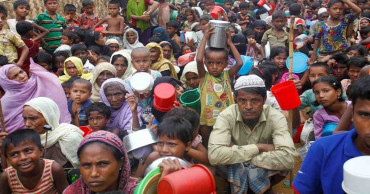UN Human Rights Council
Bangladesh elected as Vice President of UN Human Rights Council
Bangladesh has been elected unanimously to serve as a Vice President of the Human Rights Council, the prime intergovernmental body of the United Nations responsible for the promotion and protection of all human rights around the globe. The decision was made on December 9 afternoon, when the Human Rights Council met for an organizational session pertinent to the Council’s work for the year 2025.
As an elected Vice-President, the Permanent Representative of Bangladesh to the UN and other International Organizations in Geneva will join the bureau of the Human Rights Council from 01 January to 31 December 2025. It is noteworthy that the bureau of the Human Rights Council consists of one President and four Vice Presidents representing each of the five UN regional groups.
EU Mission in Dhaka launches publication capturing protests, aspirations for a ‘New Bangladesh’
The election process for Vice-Presidency started in October 2024, when Bangladesh expressed its interest in serving in the Bureau as the Vice President representing the Asia-Pacific Group (APG). The APG unanimously supported the candidature of Bangladesh for the Vice-Presidency and forwarded the nomination for the consideration of the wider memberships of the Council. Finally, the process culminated successfully when Bangladesh earned unanimous support of the entire Council membership to serve as Vice President.
Bangladesh-US defence dialogue starts Wednesday in Hawaii
This marks the first time that Bangladesh is going to serve as the Vice President of this prestigious UN human rights body since the Human Rights Council was established by the UN General Assembly in 2006. This is yet another example of the trust and confidence that the international community reposes on Bangladesh under the prudent leadership of the Hon’ble Chief Adviser, Professor Muhammad Yunus as well as recognition of the active role and growing influence of Bangladesh in multilateralism.
1 year ago
UN review on human rights on Nov 13: Bangladesh govt prepares to highlight efforts
The government has taken preparations to highlight its efforts as Bangladesh's human rights record will be examined by the United Nations Human Rights Council’s Universal Periodic Review (UPR) Working Group for the fourth time on November 13.
The review meeting, to be held in Geneva, will be webcast live.
Bangladesh is one of 14 states to be reviewed by the UPR Working Group during its ongoing session from November 6 to 17, 2023.
Also read: UN rights body not 'correctly' informed on recent violence in Dhaka: Momen
Bangladesh’s first, second and third UPR reviews took place in February 2009, April 2013, and May 2018, respectively, said an official.
Usually, Law Minister Anisul Huq and State Minister for Foreign Affairs Md Shahriar Alam, along with senior officials, join the review.
The law minister is likely to lead the Bangladesh delegation this time around as well.
The UPR Working Group comprises the 47 member states of the Human Rights Council.
Also read: UN rights body studying text of Cyber Security Bill closely
However, each of the 193 UN member states can participate in a country review.
The documents on which the reviews are based are:
1) National report — information provided by the state under review.
2) Information contained in the reports of independent human rights experts and groups, known as the Special Procedures, human rights treaty bodies, and other UN entities.
3) Information provided by other stakeholders including national human rights institutions, regional organizations, and civil society groups.
The UPR is a peer review of the human rights records of all 193 UN member states.
Since its first meeting in April 2008, all 193 UN member states have been reviewed thrice.
During the fourth UPR cycle, states are again expected to spell out steps they have taken to implement recommendations posed during their previous reviews which they committed to follow up on and highlight recent human rights developments in the country.
Universal Periodic Review
The Universal Periodic Review (UPR) is a unique mechanism of the Human Rights Council that calls for each UN member state to undergo a peer review of its human rights records every 4.5 years.
The UPR provides each state the opportunity to regularly:
1) Report on the actions it has taken to improve the human rights situations in their countries and to overcome challenges to the enjoyment of human rights.
2) Receive recommendations – informed by multi-stakeholder input and pre-session reports – from UN member states for continuous improvement.
Established in March 2006 by the UN General Assembly in resolution 60/251, the UPR is designed to prompt, support, and expand the promotion and protection of human rights in every country.
Also read: UN rights body urges 'peaceful, inclusive, safe environment' ahead of election
As a constitutional democracy, Bangladesh continues to remain "fully committed" to protecting human rights for all.
Under the government led by Prime Minister Sheikh Hasina, Bangladesh has been adopting progressive policies to realize a better society for all where fundamental human rights, the rule of law, equality, and justice prevails, officials said.
Bangladesh considers all human rights to be universal, indivisible, interrelated, interdependent, and mutually reinforcing.
Since the 3rd cycle of Universal Periodic Review, the government of Bangladesh continued to adopt legislative and policy reforms, "enhance" democratic institutions and accountability mechanisms to realize the aspiration of “a society in which the rule of law, fundamental human rights and freedom, equality, and justice, political, economic and social, will be secured for all citizens” as pledged by the constitution.
2 years ago
Demand for global recognition of 1971 genocide included by UN
The UN Human Rights Council has included the demand for international recognition of genocide committed by the Pakistani military forces and their collaborators against the Bangalis during the Liberation War of Bangladesh in 1971.
The demand is included as agenda item 3 of the UN Human Rights Council’s 53rd session scheduled for June 19- July 14.
Read more: Researchers, scholars urged to present facts of Bangladesh genocide before global community
UN Secretary-General Antonio Guterres received the written statement issued by the Bangladeshi diaspora organisation, Stichting BASUG (Bangladesh Support Group) with Special Consultative Status of the Economic and Social Council (ECOSOC) of the UN along with pro-liberation organisations seeking to establish a secular Bangladesh -- Aamra Ekattor, Projonmo '71, European Bangladesh Forum, and Seraji Foundation.
The statement, which reiterated their demand for the “International Recognition of the 1971 genocide”, was circulated in accordance with Economic and Social Council (ECOSOC) resolution 1996/31 on 29 May.
Read more: West must recognize 1971 genocide Pakistan army committed in Bangladesh: Shahriar Alam
2 years ago
India, UAE re-elected to UN Human Rights Council for new term
India was re-elected to the UN Human Rights Council for the 2022-24 term on Thursday with an overwhelming majority in the General Assembly, with New Delhi’s envoy describing the election as a "robust endorsement" of the country's strong roots in democracy, pluralism and fundamental rights enshrined in the Constitution.
According to The Saudi Gazette, the 76th UN General Assembly held elections on Thursday for 18 new members of the UN Human Rights Council who will serve for a period of three years, starting in January 2022.
India on being re-elected to the UNHRC for the 2022-24 term vowed to continue to work for the promotion and protection of human rights through “Samman, Samvad and Sahyog".
Read: India introduces draft resolution in UN over observer status for international solar alliance
“India gets re-elected to the @UN_HRC (2022-24) for a 6th term with overwhelming majority. Heartfelt gratitude to the @UN membership for reposing its faith in India," India’s Permanent Mission to the UN tweeted.
"We will continue to work for promotion and protection of Human Rights through #Samman #Samvad #Sahyog #Samman #Samvad #Sahyog," it added.
India got 184 votes in the 193-member assembly, while the required majority was 97.
"I am truly delighted at this overwhelming support for India in elections to Human Rights Council. It’s a robust endorsement of our strong roots in democracy, pluralism and fundamental rights enshrined in our Constitution.
“We thank all UN member states for giving us a strong mandate,” India’s Permanent Representative to the UN Ambassador T.S. Tirumurti told PTI.
India’s current term was set to end on Dec. 31 2021. For election for the term 2022-2024, there were five vacant seats in the Asia-Pacific States category — India, Kazakhstan, Malaysia, Qatar and United Arab Emirates.
Read: 9 dead as rains trigger landslides in India
The 193-member General Assembly elected by secret ballot Argentina, Benin, Cameroon, Eritrea, Finland, Gambia, Honduras, India, Kazakhstan, Lithuania, Luxembourg, Malaysia, Montenegro, Paraguay, Qatar, Somalia, UAE and the USA for the 2022-2024 term on the Council.
The US joined the cohort more than three years after the Trump administration quit the 47-member body over what it called chronic bias against Israel and a lack of reform.
The United States, which was unopposed, received 168 votes in the secret ballot by the 193-member General Assembly. It begins a three-year term on Jan. 1 — pitting Washington against Beijing and Moscow, who began council terms this year.
China and some of its allies including Belarus and Venezuela have taken advantage of the US absence from the council to push through joint statements supporting Beijing's actions in Hong Kong, Xinjiang and Tibet, and denouncing "human rights violations" in Western countries, including against indigenous Canadians.
For Thursday's vote, non-governmental organizations accused regional groups of stitching up a "legitimizing facade" rather than a genuine contest at the council, by presenting the same number of candidates as vacant seats.
India’s mission congratulated other UN member states for their election to the Human Rights Council, which consists of 47 Member States elected directly and individually by secret ballot by the majority of the members of the General Assembly.
Read: Made in India virus kits boost testing, and local industry
The membership is based on equitable geographical distribution, and seats are distributed among regional groups Group of African States (13), Group of Asia-Pacific States (13), Group of Eastern European States (6), Group of Latin American and Caribbean States (8) and Group of Western European and other States (7).
As of January 2021, 119 of the 193 UN member states will have served as a member of the HRC. "This broad membership not only reflects the UN’s diversity, but it gives the Council legitimacy when speaking out on human rights violations in all countries,” the UN said.
US Ambassador at UN Linda Thomas-Greenfield said Washington’s election to the Council has “fulfilled President Biden’s campaign pledge to rejoin the Human Rights Council” and the US will “work to ensure this body lives up to these principles.”
4 years ago
Right to healthy environment: States urged to take bold actions
United Nations (UN) High Commissioner for Human Rights Michelle Bachelet Friday called on states to take bold actions to give prompt and real effect to the right to a healthy environment, following a UN Human Rights Council's landmark decision.
The Human Rights Council recognised for the first time that having a clean, healthy and sustainable environment is indeed a human right, in its resolution 48/13.
The Council called on states to work together, and with other partners, to implement this newly recognised right.
At the same time, through a second resolution (48/14), the Council also increased its focus on the human rights impacts of climate change by establishing a Special Rapporteur dedicated specifically to the issue.
"The Human Rights Council's decisive action in recognising the human right to a clean, healthy and sustainable environment is about protecting people and the planet – the air we breathe, the water we drink, the food we eat. It is also about protecting the natural systems which are basic preconditions to the lives and livelihoods of all people, wherever they live," the High Commissioner said.
Read: Mohib's killing, Rohingya repatriation: Bachelet for redoubling global pressure on Myanmar
"Having long called for such a step, I am gratified that the Council's action today recognises environmental degradation and climate change as interconnected human rights crises."
"Bold action is now required to ensure this resolution on the right to a healthy environment serves as a springboard to push for transformative economic, social and environmental policies that will protect people and nature," she added.
At the beginning of the current session of the Human Rights Council, the High Commissioner described the triple planetary threats of climate change, pollution and nature loss as the single greatest human rights challenge of our era.
The resolution on a healthy environment acknowledges the damage inflicted by climate change and environmental destruction on millions of people across the world.
It also underlines that the most vulnerable segments of the population are more acutely impacted.
The issue will now pass on to the UN General Assembly for further consideration.
Bachelet paid tribute to the efforts of a diverse array of civil society organisations, including youth groups, national human rights institutions, indigenous peoples' organisations, businesses and many others worldwide who have been advocating for full international recognition of this right.
Read: Action must be taken now over Rohingyas' rights violations: Bachelet
She stressed the importance that the rights to participation, access to information and access to justice are also respected for the human right to a healthy environment to be fully realised.
Noting that an unprecedented number of environmental human rights defenders were reported killed last year, the High Commissioner urged states to take firm measures to protect and empower them.
"We must build on this momentum to move beyond the false separation of environmental action and protection of human rights. It is all too clear that neither goal can be achieved without the other, and to that end, a balanced, human rights-based approach to sustainable development must be ensured," she said.
4 years ago
Bangladesh seeks UN steps to prevent another humanitarian catastrophe in S Asian region
Bangladesh on Tuesday called upon the United Nations to take concrete steps to prevent another humanitarian catastrophe in the South Asian region.
Bangladesh thinks an Afghan-led and Afghan-owned inclusive political dialogue anchored on national sovereignty and territorial integrity is essential for establishing and sustaining peace in Afghanistan.
Md. Mustafizur Rahman, Ambassador and Permanent Representative of Bangladesh to the United Nations Office at Geneva shared Bangladesh's position at the 31st Special Session of the UN Human Rights Council on the ongoing human rights situation in Afghanistan.
Mentioning an unstable Afghanistan as a serious threat to regional and global peace and security, Ambassador Rahman said Bangladesh wants to see Afghanistan as a peaceful, stable, prosperous, responsible and contributing member of the global community.
Read: Dhaka calls for lasting peace as OIC stands by commitment to Afghanistan
He reiterated Bangladesh's commitment to contribute to the reconstruction and socio-economic development of Afghanistan as a brotherly and friendly country.
The Special Session of the UN Human Rights Council was convened at the request of 104 UN member states, including the countries of the Organization of Islamic Cooperation and the European Union.
At the end of the Session, a resolution entitled "Strengthening the Promotion and Protection of Human Rights in the Islamic Republic Afghanistan" was adopted by consensus.
4 years ago
UN Human Rights Council adopts resolution to end Rohingya crisis
The UN Human Rights Council has unanimously adopted a resolution calling for a solution to the Rohingya crisis.
Since the massive influx of the Rohingya refugees from Myanmar into Bangladesh in August 2017, this is the first time that any resolution on the issue was adopted in the UN without a vote, due to the intense diplomatic efforts made by the Permanent Mission of Bangladesh in Geneva.
Read: FM seeks clear roadmap from UN for Rohingya repatriation
The resolution on the 'Human Rights Situation of Rohingya Muslims and other Minorities in Myanmar' was unanimously adopted on Monday at the ongoing 47th session of the Human Rights Council.
The adoption of the resolution by consensus is a big milestone for Bangladesh, said the Bangladesh Mission in Geneva on Tuesday.
Earlier, at the initiative of Bangladesh, all member states of the Organization of the Islamic Conference (OIC) presented the draft before the Council.
In the context of the existing political situation in Myanmar, there had been strong divergences and differences among the UN member states on various elements of the text from the outset.
After tough and lengthy negotiations at several phases, the resolution was adopted by the Council.
Read: Int'l community's stronger role sought for Rohingya repatriation
4 years ago
Terrorism: Dhaka, Colombo to work together to address challenges in region, beyond
Recognising the threats to pluralistic societies arising from terrorism, violent extremism and radicalisation, Bangladesh and Sri Lanka have pledged to work together to counteract such challenges in both the countries, the region and beyond.
4 years ago
UN rights body trains spotlight on Myanmar following coup
The UN’s top human rights body held an urgent session on Friday to discuss the military coup in Myanmar, facing a call for the release of people “arbitrarily detained” — including civilian government leader Aung San Suu Kyi — and more action by UN officials to increase scrutiny of the country.
5 years ago
Action must be taken now over Rohingyas' rights violations: Bachelet
UN High Commissioner for Human Rights Michelle Bachelet on Monday said action must now be taken to properly remedy the serious violations the Rohingya have suffered, and include them into the life of their country.
5 years ago



.jpg)
.jpg)
.jpg)


.jpg)






